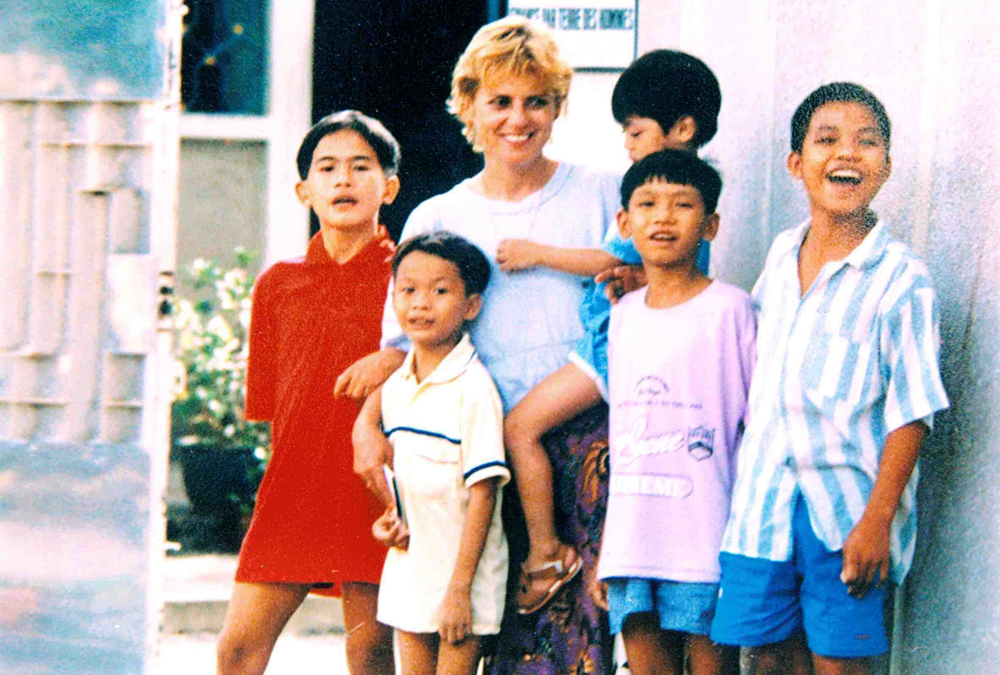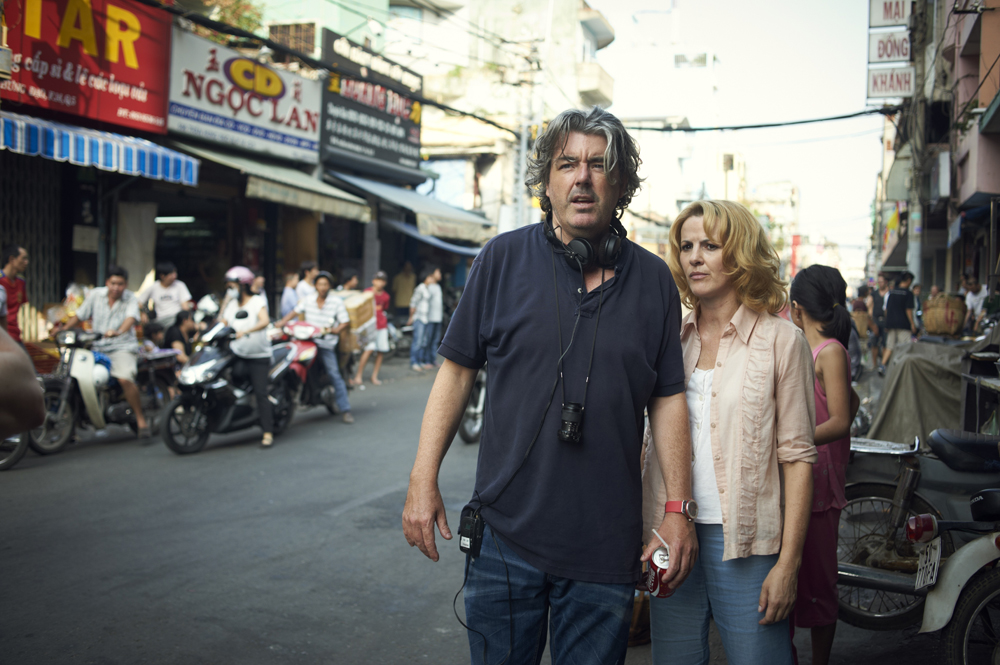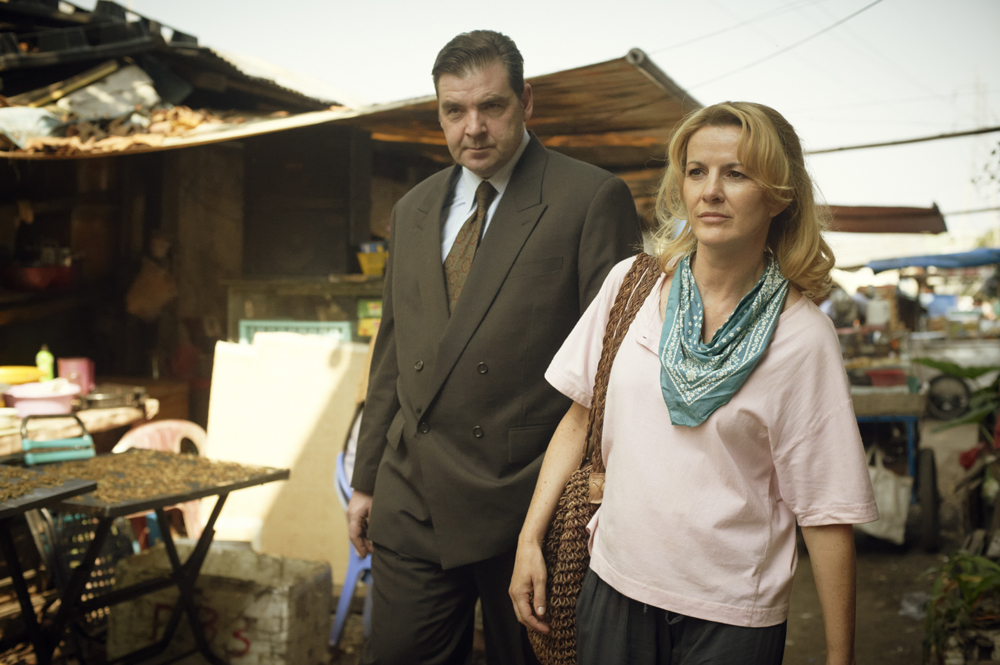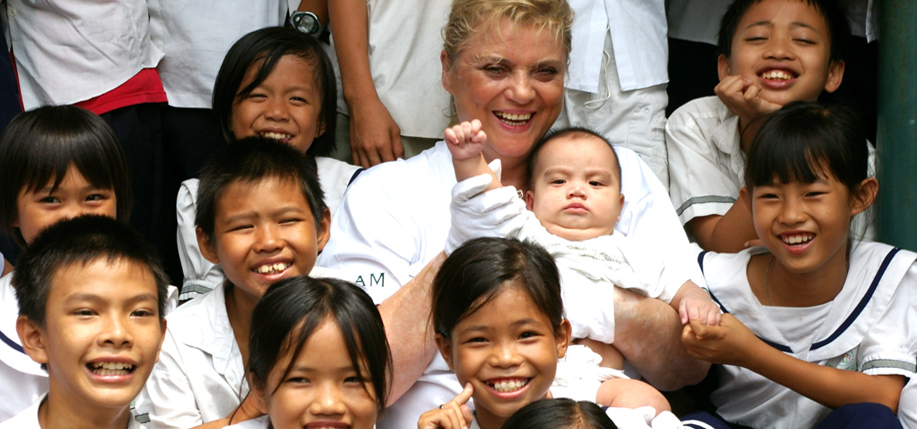The story of Christina Noble, whose memories of her poverty-ridden childhood in Dublin inspired her to help thousands of children in Vietnam, is now the subject of a major movie.
Christina Noble isn’t quite what I expected. I had anticipated someone akin to Mother Teresa dressed in a simple cotton sari, but the woman who greets me in the foyer of Dublin’s Shelbourne Hotel is wearing a fluorescent pink fluffy jacket, and her peroxide blonde hair is pulled back off her face into a messy bun. If she doesn’t look like she belongs in one of the grandest buildings on St. Stephen’s Green, it’s because she doesn’t. Noble belongs on the streets of Vietnam where she has worked with street children for the past 25 years.
Mama Tina, as she is known to the children, may not be as polished as the people who surround her in the Shelbourne Hotel, but she has a far more interesting story to tell. It’s a story that is told in a new film called Noble.
Directed, written and co-produced by Stephen Bradley, this biopic is the brainchild of his wife Deirdre O’Kane, one of Ireland’s best known stand-up comedians, who stars in the film.
O’Kane was struck by Christina’s story many years ago. “I read her books 20-odd years ago and thought to myself that I was definitely going to meet her one day,” she remembers. “Then, after I started my career as a stand-up comic, an email arrived asking if I’d emcee an event for the Christina Noble Foundation. I ended up doing it every year for five years and got to know Christina as a result.”
The idea to make a film about Noble wasn’t an immediate one. “Steve had always wanted us to work on a project together but I never had any ideas to suggest,” says Deirdre. “He brought me out for lunch for my 40th birthday and asked me again. I was exasperated at this stage and almost without thinking about it, I said I wanted to make a film about Christina. The idea must have been in my head all along. I just didn’t realize it.”

It was the combination of Christina’s story and the strength and warmth of her character that intrigued Deirdre. “Her story can be grim and relentless but Christina herself is a fun-loving person,” she says. “She bursts into song anywhere and everywhere. She’s a fighter whose spirit has not been broken.”
I see these aspects of Christina’s personality for myself when we meet up in early February. She tells me of growing up in the Dublin tenements of the 1940s. Her mother suffered from ill health and her father spent what little money there was to be had on drink.
“He was injured in a boxing match and was left with permanent ringing of the ears. He started to drink as a result,” she says of her father. Her parents were from different backgrounds. “My mother was from the country and was very particular. She’d put my hair in rags to make it curly,” she recalled wistfully.
When she was ten, her mother died and Christina and her siblings were sent to different orphanages. She spent four years in an industrial school run by nuns in the west of Ireland, eventually escaping to Dublin, where she slept rough in a hole in the ground she dug for herself in Phoenix Park. There, she was gang raped, resulting in a pregnancy she carried to term. Christina was sent back to the nuns, who forced her to give up her baby.
When her story gets too much for her to recount, Christina starts singing instead. As a child, she used to busk to make money for her family. Now she appears to find consolation in singing.
“I love singing,” she says. “Everywhere I go, I get people to join me in a song.”
The young Christina also found solace in her faith. “I used to cry and cry at the thought of Jesus being crucified,” she says. “I loved God and Jesus so much. I still do.”
At the age of 18, she went to England and soon got married. She had three children, but her marriage proved to be difficult and unhappy.
Misery appeared to be all that life had in store for Christina, but this changed following a strange dream she had in 1971.
“In the dream, naked children were running down a dirt road fleeing from a napalm bombing. The ground under the children was cracked and coming apart and the children were reaching to me. One of the girls had a look in her eyes imploring me to take her to safety. Above the children was a white light and the word ‘Vietnam.’”
At that time, Christina wouldn’t have been able to find Vietnam on a map but 18 years later, in 1989 after her marriage ended, she decided to visit the country. She had very little money, but her first sight of the street children of Ho Chi Minh City made her realize why she was there. “The children needed me,” she says. “Everything I have done since then, I have done for the children.”
The film portrays exactly what Christina has done. It shows us how she set up the Christina Noble Children’s Foundation and how it runs various shelters, medical centers, educational scholarships, and other schemes that have transformed the lives of approximately one million children in Vietnam and, since 1997, in Ulaanbaatar, Mongolia, too.

The film cuts between Christina’s life in Vietnam, her early life in the tenements and the industrial school, and her life as a teenager and young married woman in England.
Deirdre portrays Christina as she embarks on her new life in Vietnam, and it’s a role she clearly loved playing.
“It’s so special to me; I may never have another job like it,” she says. “I want everyone to know there are people like Christina out there doing miraculous things. She has achieved amazing things and she shows us that we can, too.”
Although she relished the role, the moviemaking process was not easy for Deirdre and her husband. Their first challenge was convincing Christina to give them permission to make the film.
“It took us two years to get her to sign over the rights,” says Deirdre. “Christina has had her trust in people shaken a lot, but I knew we were the right people to make the film. I felt it was divined.”
Getting permission was merely the beginning of the process. Whittling Christina’s eventful life down to a manageable screenplay was the colossal task facing Deirdre’s husband Stephen. “I took a back seat while they got to know each other,” says Deirdre. “They spent a lot of time together and she took him to different places, including Phoenix Park where she had lived in a hole in the ground.”
Capturing the essence of Christina’s personality was Deirdre’s challenge. “She’s so multifaceted and there’s too much of her to show in 100 minutes,” laughs Deirdre. “I’d been observing and watching her for years, but I decided it was best to just focus on the actual screenplay. I read it every day for four months and listened to recordings of her voice using my headphones so I could get her accent.”
Gathering a cast came after that. Deirdre plays the older Christina, and Sarah Greene, the Cork-born actress best known for her recurring role as Sarah in the television series Vikings, plays her as a young woman. Noble also stars Brendan Boyle (who plays John Bates, the valet in Downton Abbey) as Gerry Shaw, the businessman who helps Christina fund her project, and Liam Cunningham (best known as Ser Davos Seaworth, the former smuggler in Game of Thrones) as Christina’s father.

Finally, there was the crucial test of ten weeks filming in Vietnam. “It was chaotic and constantly felt as though the wheels were going to come off the entire film because there is no infrastructure there,” says Deirdre. “People usually film in Thailand instead, but we wanted to be true to Christina’s story and we wanted to use kids from her foundation in the film.”
Their efforts were ultimately worthwhile. “Vietnam is an incredibly special place and there was good karma for us everywhere,” says Deirdre. “There’s a scene in the film where I sing a song in a bar and afterwards the barman told me Christina used to sing in that same bar 20 years ago. I didn’t know that. We’d just picked the bar at random. That sort of thing kept happening throughout filming – there were so many people who had stories about Christina and what she’d done.”
Noble, which opened across the U.S. on May 8 to good reviews, won the Panavision Spirit Award at the Santa Barbara International Film Festival, and prizes at Dallas, Nashville, San Diego and Newport Beach. “The story keeps the kettle boiling throughout the ever-engaging 100 minutes, which might be down to the funny scene/angry scene/uplifting scene/touching scene (and repeat) narrative style, or the performances [Stephen Bradley] wrangles out of his three leads,” Gavin Burke wrote in a review for entertainment.ie.
Justin Lowe, praised the acting in the Hollywood Reporter, writing, “O’Kane nicely captures Noble’s signature mix of compassion and defiance as a survivor for whom defeat just isn’t an option. The young actors playing the childhood and teenage versions of Noble capably lay the groundwork for O’Kane to build upon. The Vietnamese casting is similarly strong, particularly Nguyen as the suspicious and protective caregiver who lets down her guard just enough to give Noble the fighting chance she needs.”
“Our American distributor is Aspiration Films and their name is a good match for our film,” says O’Kane. “You can’t help but have more love for humanity and a bigger and more open heart after you hear Christina’s story. I think her story is also important for those who are down on their luck. Christina was 44 when she changed her life. A lot of people think their road is carved out for them by the time they arrive at that age, but for her, it was only beginning.”
From what I saw when I met Christina in Dublin, her story is far from over. She had just returned from New York where she had been given the Albert Schweitzer Leadership for Life Award. And although she was recovering from a recent medical procedure, she was already planning to return to Vietnam as soon as possible.
“I can’t sit at home when the children need me,” she says. “I have to go to them.” ♦


I just watched this film, thank you so much for making it. Thank you Christina for going when the Lord called you. With God all things are possible and thank I Him for you and for what He has done through you for the children of Vietnam. God Bless you all.
We first got to hear about Christina Noble whilst living in Vietnam between 1998 and 2014
During the earlier years in Vung Tau we met a British guy called Neil Rigdon who had earlier worked for BP but was now heavily involved in running a restaurant and bar and within this restaurant and bar he created a golf society
and subsidised the green fees .
We happened to be having lunch one day in the restaurant when in walked Christina wanting to have a chat with Neil having made the journey from Hanoi to Vung Tau .
Neil by the way in the early years had donated an amazing amount of money to Christina in order to set up the Foundation which is still running to this day.
My husband David and I had the pleasure of meeting Christina that day and with the help of Neil ‘s contribution has done so much for the children of Vietnam and also in later years in Mongolia.
I would just like to say what an amazing lady she has proved to be.. ..one of a kind and truly with a heart of gold who had given all to care for so many street children over the years .Thank you Christina .
Christina and Magnus Barrow of Mary’s Meals, Scotland – feeding 2 million children a DAY.
DIVINELY- inspired people…thank the Lord.
I vaguely remember Christina as a young child on the streets of Dublin around James’ St area. I was also brought up in a Dublin tenement off Parkgate St not far away. I met her formally in the Clarence ???? Hotel in 1989, after she appeared on the Late Show. I remember telling her that the famous Vietnamese leader General Hi Chi Minh was watching the Irish struggle for self determination and was an eyewitness to Terence McSwiney’s funeral cortège going through the streets of London, after the longest hunger strike ever recorded. I thought it might be an interesting talking point to bring up with Vietnamese leaders, reinforcing a rare connection with Ireland. Many people would be irreparably damaged by her background; it is a tribute to her indomitable spirit that she triumphed over adversity. Yes roses ???? sometimes grow on dung hills!
My husband and I have just finished the movie about Christina Noble and are greatly moved. How inspiring to see her so difficult childhood and then the rape and then losing her boy, yet not giving up on Jesus. Her raw faith is all inspiring. The scene as the film ends with her in person surrounded by the multitude of children just wiped me out! How many thousands upon thousands of lives she saved and transformed. And then to top it all off to see her very own children involved and her son being in the leadership of her organization!! Surely this remarkable true story of such a powerful faith in a woman who was filled with an indomitable strength to follow her heart will inspire others to follow theirs as well. We loved the casting. The director’s wife was just amazing. I think she was chosen by the Lord to do the movie and portray Christina. The screenplay was beautifully written and moved along, never losing the momentum of her story. The director did a phenomenal job in every way. What a movie made from the heart about the heart of love and giving back. Wow!
My husband and I in New Zealand just watched the film on T V. Thank you guys for making this and thank you Christina for persevering and thank you Lord for leading and empowering Christina. Yes, May this film continue to greatly inspire people to DO.